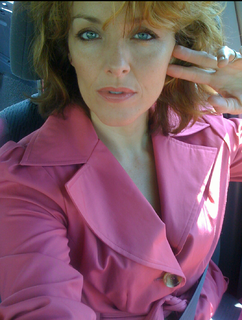A Quote by Edward Hirsch
I think ancient cultures incorporated death into the experience of life in a more natural way than we have done. In our obsessive focus on youth, on celebrity, our denial of death makes it harder for people who are grieving to find a place for that grief.
Related Quotes
Any kind of grieving that is not allowed causes a break. In our culture, grieving in public is not encouraged, but in other cultures, it is done publicly. Some cultures have walls where people can cry. We don't have that. We have theatre where there's always the chance for you to face things within yourself.
Small things such as this have saved me: how much I love my mother — even after all these years. How powerfully I carry her within me. My grief is tremendous but my love is bigger. So is yours. You are not grieving your son’s death because his death was ugly and unfair. You’re grieving it because you loved him truly. The beauty in that is greater than the bitterness of his death.
Whether we experience it or not, grief accompanies all the major changes in our lives. When we realize that we have grieved before and recovered, we see that we may recover this time as well. It is more natural to recover than to halt in the tracks of grief forever. Our expectations, willingness and beliefs are all essential to our recovery from grief. It is right to expect to recover, no matter how great the loss. Recovery is the normal way .
The dignity to be sought in death is the appreciation by others of what one has been in life,... that proceeds from a life well lived and from the acceptance of one's own death as a necessary process of nature.... It is also the recognition that the real event taking place at the end of our life is our death, not the attempts to prevent it.
By 'coming to terms with life' I mean: the reality of death has become a definite part of my life; my life has, so to speak, been extended by death, by my looking death in the eye and accepting it, by accepting destruction as part of life and no longer wasting my energies on fear of death or the refusal to acknowledge its inevitability. It sounds paradoxical: by excluding death from our life we cannot live a full life, and by admitting death into our life we enlarge and enrich it.
The way we deny death says something about how we live our lives, doesn't it? At least in Sweden or Scandinavia, you don't have to search further back in time than maybe three generations to find another way to relate to death. People then had a different, closer relationship with death; at least it was like that in the countryside.
The coarsening of our culture towards violent death has more consequences than war. Tragically, this same culture has led to the death of 50 million unborn children in the last 40 years. I don't think a civilization can long endure that does not have respect for all human life, born and not yet born. I believe there will come a time when we are all judged on whether or not we took a stand in defense of all life from the moment of conception until our last natural breath.
I often like to think that our map of the world is wrong, that where we have centered physics, we should actually place literature as the central metaphor that we want to work out from. Because I think literature occupies the same relationship to life that life occupies to death. A book is life with one dimension pulled out of it. And life is something that lacks a dimension which death will give it. I imagine death to be a kind of release into the imagination in the sense that for characters in a book, what we experience is an unimaginable dimension of freedom.
God knows we have our own demons to be cast out, our own uncleanness to be cleansed. Neurotic anxiety happens to be my own particular demon, a floating sense of doom that has ruined many of what could have been, should have been, the happiest days of my life, and more than a few times in my life I have been raised from such ruins, which is another way of saying that more than a few times in my life I have been raised from death - death of the spirit anyway, death of the heart - by the healing power that Jesus calls us both to heal with and to be healed by.
So the experience of death is turned into that of the exchange of functionaries, and anything in the natural relationship to death that is not wholly absorbed into the social one is turned over to hygiene. In being seen as no more than the exit of a living creature from the social combine, death has been domesticated: dying merely confirms the absolute irrelevance of the natural organism in face of the social absolute.







































